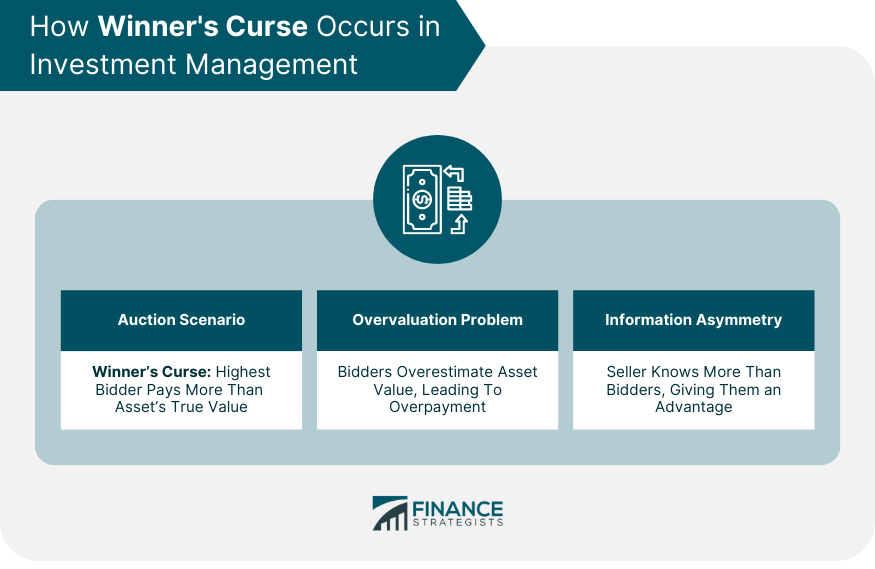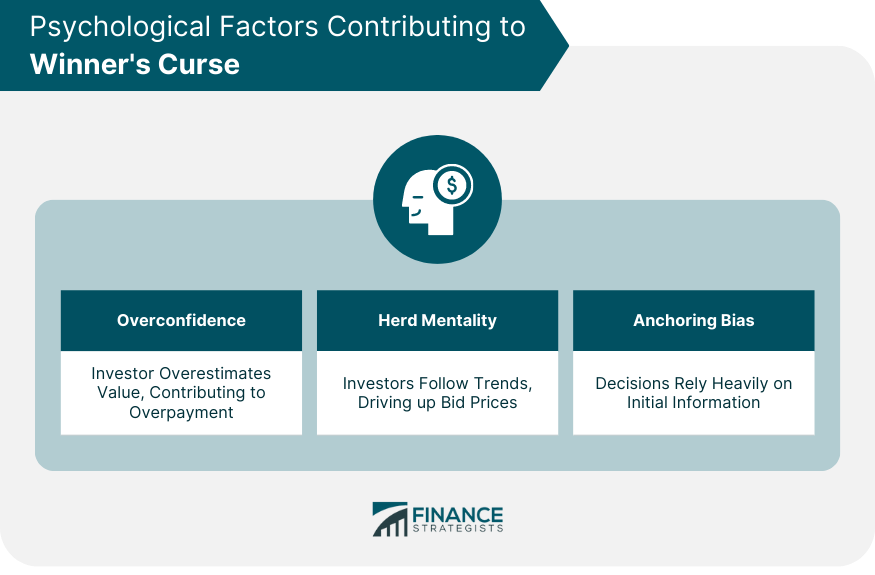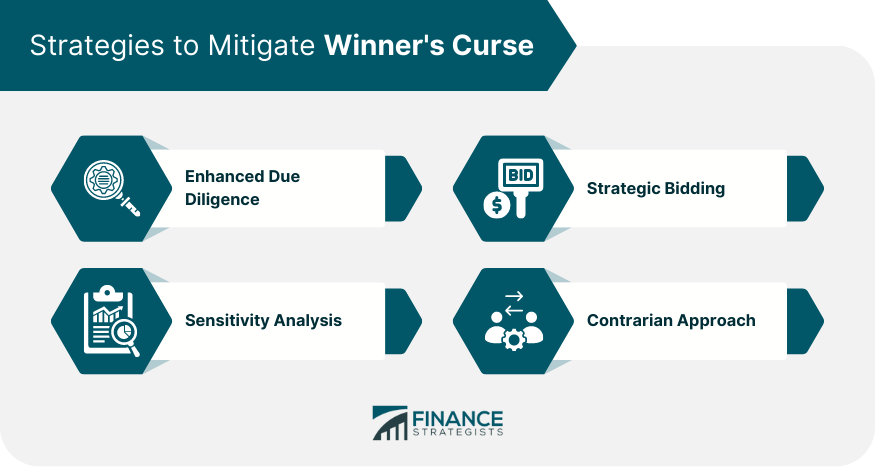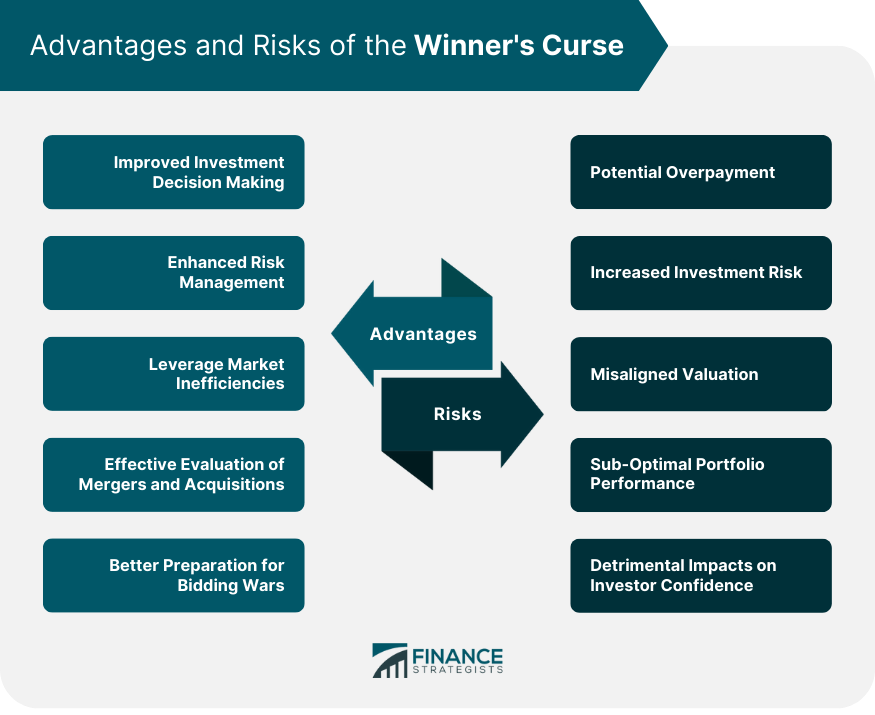The winner's curse is often observed in auctions and competitive bidding environments, where the winning bidder tends to overpay. The term is widely used in economics, finance, and investment management. It highlights a paradox where victory may entail a significant cost, eroding the perceived benefit of winning. The origins of this term date back to the 1970s when it was used to describe a common situation in offshore oil drilling auctions. It was noticed that the highest bidders often paid excessively, which didn't translate into a proportionate level of return, leading to financial loss. This understanding then entered broader financial and investment areas, highlighting the pitfalls of aggressive bidding strategies. Scenarios ripe for the winner's curse within investment management typically involve competitive bidding. These can occur during company mergers and acquisitions, asset auctions in bankruptcy situations, or buying and selling securities. Having outbid the competition, the highest bidder often falls into the winner's curse by paying more than the asset's true worth. Overvaluation sits at the center of the winner's curse. Bidders price an asset based on their perception of its value. However, in the heat of a competitive bidding environment, it's easy to let emotions take over and place bids that surpass the asset's actual value. In many auction situations, the seller knows more about the asset than the potential buyers. This information asymmetry can lead to bidders making an overzealous bid, resulting in the winner's curse. Overconfidence is a human trait that can lead investors to believe they possess superior or exclusive information. This can make them overly optimistic valuations, contributing to the winner's curse. Investors often follow the trends or actions of other investors. The assumption is that the crowd's wisdom or the direction of market sentiment can be right. This herd mentality can drive up bid prices in auctions, leading to the winner's Curse. Anchoring bias is the tendency to rely heavily on the first piece of information offered when making decisions. If investors base their bidding decisions on initial price points or estimates, even when subsequent information suggests these are incorrect, it could contribute to the winner's curse. To avoid the winner's curse, thorough due diligence is essential. It lets investors deeply understand the asset's intrinsic value, risk, and return profile, thereby informing better bidding decisions. Adopting strategic bidding approaches, such as bid shading, can also help. This technique involves bidding less than what one believes the asset is worth to factor in the likelihood of overpayment. Performing a sensitivity analysis is another helpful strategy. By understanding how changes in key assumptions can affect the asset's value, investors can identify various possible outcomes, helping to mitigate the risk of overpayment. Contrarian investors swim against the tide, often buying assets when others sell and vice versa. This independent thinking can help them to avoid the frenzy of bidding wars and the subsequent winner's curse. Understanding the winner's curse can lead to more rational investment decisions. By recognizing the potential pitfalls of overpriced assets, investors can focus on assets with genuine growth potential, thereby improving the overall quality of their investment decisions. Awareness of the winner's curse can contribute to effective risk management. Recognizing the potential for overpayment enables the implementation of risk mitigation strategies. This can mean conducting thorough due diligence, adopting conservative bidding strategies, or both. Knowledge of the winner's curse can allow investors to leverage market inefficiencies. They can identify and steer clear of overpriced assets while finding undervalued assets that other investors have overlooked. Understanding the winner's curse can lead to more effective evaluations in mergers and acquisitions. It enables buyers to avoid overpaying for target companies by factoring the potential for overpayment into their bidding strategy. Awareness of the winner's curse can better prepare investors for bidding wars. With this knowledge, they can approach such situations with a strategy to avoid overpayment, reducing potential losses. The most significant risk of ignoring the Winner's Curse is the potential for overpayment. Overpayment can turn what seemed like a profitable investment into a financial liability, leading to significant losses. By overpaying for an asset, investors inherently increase their investment risk. The asset will need to perform exceptionally well to deliver an acceptable return. This heightened risk can jeopardize the overall profitability of the investment. Ignoring the Winner's Curse can lead to misaligned valuations. If investors base their decisions on inflated prices rather than the asset's intrinsic value, this can result in a skewed perception of the market and poor investment decisions. If an investor ends up with a number of overpriced assets due to ignoring the Winner's Curse, it can adversely affect their investment portfolio's overall performance. Repeated instances of the Winner's Curse can result in significant losses, which can dent investor confidence. This can make investors more risk-averse, potentially leading them to miss out on profitable investment opportunities. Understanding the winner's curse in investment management provides advantages such as improved decision-making, enhanced risk management, and the ability to leverage market inefficiencies. It enables effective evaluation of mergers and acquisitions and better preparation for bidding wars. Ignoring the winner's curse, however, carries risks including potential overpayment, increased investment risk, misaligned valuations, sub-optimal portfolio performance, and detrimental impacts on investor confidence. To mitigate the winner's curse, strategies such as enhanced due diligence, strategic bidding approaches, sensitivity analysis, and a contrarian investment approach can be employed. By recognizing psychological factors like overconfidence, herd mentality, and anchoring bias, investors can make more informed decisions and avoid overpayment, ultimately leading to more successful outcomes in their investment endeavors.What Is Winner's Curse?
How Winner's Curse Occurs in Investment Management
Auction Scenario
Overvaluation Problem
Information Asymmetry

Psychological Factors Contributing to Winner's Curse
Overconfidence
Herd Mentality
Anchoring Bias

Strategies to Mitigate Winner's Curse
Enhanced Due Diligence
Strategic Bidding Approaches
Sensitivity Analysis
Embracing a Contrarian Investment Approach

Advantages of Understanding Winner's Curse
Improved Investment Decision Making
Enhanced Risk Management
Ability to Leverage Market Inefficiencies
Effective Evaluation of Mergers and Acquisitions
Better Preparation for Bidding Wars
Risks of Ignoring Winner's Curse
Potential Overpayment
Increased Investment Risk
Misaligned Valuation
Sub-Optimal Portfolio Performance
Detrimental Impacts on Investor Confidence

Conclusion
Winner's Curse FAQs
The winner's curse refers to overpaying for an asset in auctions or bidding wars, leading to financial burdens.
The winner's curse occurs when the highest bidder pays more than the asset's worth due to competitive bidding.
Psychological factors include overconfidence, herd mentality, and anchoring bias, which lead to overpayment risks.
Understanding the Winner's Curse improves investment decision-making, enhances risk management, and leverages market inefficiencies.
Ignoring the Winner's Curse can result in a potential overpayment, increased investment risk, misaligned valuation, sub-optimal portfolio performance, and detrimental impacts on investor confidence.
True Tamplin is a published author, public speaker, CEO of UpDigital, and founder of Finance Strategists.
True is a Certified Educator in Personal Finance (CEPF®), author of The Handy Financial Ratios Guide, a member of the Society for Advancing Business Editing and Writing, contributes to his financial education site, Finance Strategists, and has spoken to various financial communities such as the CFA Institute, as well as university students like his Alma mater, Biola University, where he received a bachelor of science in business and data analytics.
To learn more about True, visit his personal website or view his author profiles on Amazon, Nasdaq and Forbes.















